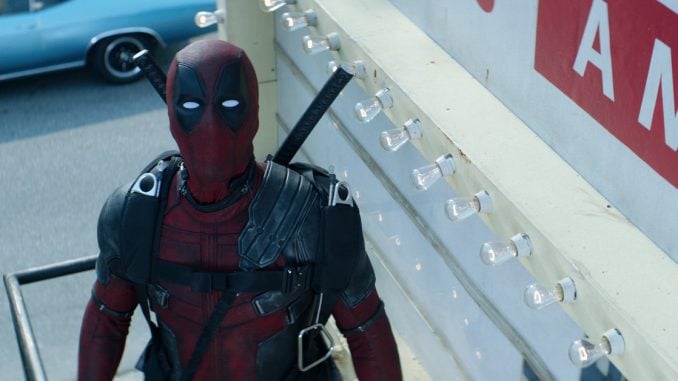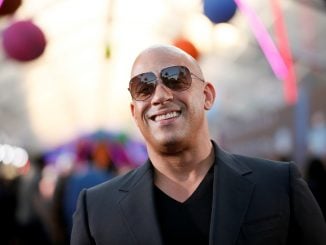
LOS ANGELES — SPOILER ALERT: The following review contains mild spoilers for “Deadpool 2.”
Thanks to some mistranslated Latin, generations of schoolchildren were brought up to believe that ancient Roman households contained a special room called a vomitorium, in which feasting nobles could purge themselves of the night’s dinner and drinks, then go back to the table and help themselves to some more. In fact, no such rooms existed – the word referred to exit passageways in Roman stadia – but the myth persists, and provides a helpful image for understanding the appeal of “Deadpool.”
In an era where massive studio comic-book franchises make up more and more of our media diets, the “Deadpool” property serves a similar emetic function: allowing the detritus accumulated from hours and hours spent binging on cinematic world-building, world-saving, world-destroying, chosen ones, and grim-darkness to be rudely, messily expelled in an orgy of bad taste.
Which is not to imply that the experience of watching “Deadpool 2″ is in any other way comparable to self-induced vomiting. In almost every respect, this sequel is an improvement on its 2016 predecessor: Sharper, grosser, more narratively coherent and funnier overall, with a few welcome new additions. It’s a film willing to throw everything — jokes, references, heads, blood, guts, and even a little bit of vomit — against the wall, rarely concerned about how much of it sticks. Plenty of it does, plenty doesn’t, and your enjoyment of the film will be entirely dependent on how willing you are to ignore the mess left behind.
“Deadpool” was something of a gamble when Fox greenlit the original (or at least, what passes for a gamble where comic book blockbusters are concerned): A hard-R satire of studio filmmaking’s biggest cash cows, with most of the humor coming at the expense of its own mother franchise, “X-Men.” The box office payoff, however, was staggering, meaning that the key dilemma facing “Deadpool 2″ is how to reconcile the financial imperative to stay at the forefront of the comic movie wave with the creative need to remain just outside it, pointing and giggling.
For example, the film’s early viewers were given the now-typical strong-arm warning against spoiling any of its various twists, secrets and cameos, yet the very first frame is itself a spoiler of another recent comic book film. To spoil that spoiler would spoil the fun, although it won’t ruin much to note that this opening scene goes on to depict our disfigured antihero (Ryan Reynolds) being blown into a bloody cloud of limbs and viscera. He’s opted to commit suicide by building-leveling explosion, and the film flashes back six weeks to explain why.
Directed by, as the opening credits note, “One of the Two Guys Who Killed John Wick’s Dog,” the first 10 minutes of “Deadpool 2″ feature roughly the same amount of spectacular bloodletting as both that film and its sequel combined, as wiseacre mercenary Deadpool slices a gruesome swath through waves of villainous henchmen. New helmer David Leitch (“Atomic Blonde”) clearly had a ball with his license to conjure maximum mayhem, but he pumps the brakes just when the proceedings are about to get truly unhinged, as Deadpool experiences a tragedy that saps his desire to go on living. Soon we’re back where we started, in his dingy apartment, as he strikes a cheesecake pose on top of several barrels of gasoline and flicks his lit cigarette.
Of course, the gruesome dismemberment of our protagonist is no huge deal: Having begun his first-film origin story as a self-described “wheelbarrow full of Stage 4 cancer,” Deadpool‘s superhuman healing abilities mean he’s back in one piece in no time. Caring for him in the meanwhile is the galvanized goody-goody Colossus (Stefan Kapicic), who’s brought him back to Professor Xavier’s School for Gifted Youngsters. Negasonic Teenage Warhead (Brianna Hildebrand) is here, too, this time with a girlfriend (Shioli Kutsuna), and these off-brand stragglers from the proper X-Men universe offer the mercenary a chance at life as a superhero trainee.
Rushing into his first job with the crew he calls “an outdated metaphor for racism in the ’60s,” Deadpool attempts to talk down an angry teenage mutant named Randall (Julian Dennison), who’s making a scene hurling fireballs at the sinister authorities who run his orphanage. His attempts at empathetic heroism go south, and both he and the kid are shipped off to the Ice Box, a high-tech prison for mutants.
Surprisingly limiting itself to a single passing prison-rape joke, the screenplay (written by Reynolds himself, Rhett Reese and Paul Wernick) starts to fill in the outlines of an actual moral arc here, as Randall looks to Deadpool as a surrogate father figure, while Deadpool rebuffs every opportunity to play the protector — at least until the arrival of Cable (Josh Brolin, finally giving this franchise an iron-sphinctered straight man), a bio-enhanced super-soldier from the future, who smashes his way into the Ice Box intent on killing Randall.
Deadpool escapes and decides to pursue redemption by rescuing Randall with his newly assembled X-Force, a posse of simpatico superheroes who are “tough, morally flexible, and young enough to carry this franchise another 10 to 12 years.” These team-building sequences — from a deskbound interview process through to the group’s first mission — are easily the funniest in the film, but as far as franchise extension goes, only Domino is likely to appear in further installments. Charismatically played by Zazie Beetz, the character also represents this film’s most quietly subversive touch: As she puts it, Domino’s lone gift is a knack for being “extremely lucky,” which Deadpool initially doubts qualifies as a superpower. Once in battle, however, her ability to stride an improbably perfect path through mounting chaos makes her virtually indistinguishable from any other cinematic caped crusader.
At its best, the film resembles an ultraviolent Looney Tunes spinoff, with Reynolds once again going full Bugs Bunny behind either a mask or a mountain of makeup — his extremities all akimbo, his rapid-fire comic patter usually landing on just the right side of obnoxiousness. At its worst, there’s something mustily mid-’90s about its self-congratulatory rudeness, its sensibilities lying somewhere between a Farrelly brothers film and a Mountain Dew commercial. Lurking behind its constant self-critiques — pointing out plot holes before you can, acknowledging when its puckish humor edges toward racism but making the joke anyway — is a strange combination of cleverness and cowardice, a self-inoculation against the very responses it goes out of its way to provoke. No matter how far “Deadpool 2″ thinks it’s pushing boundaries, it makes sure that even when a gag falls flat, the joke is always on you.



